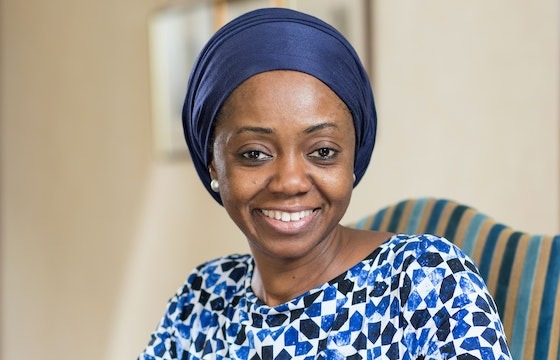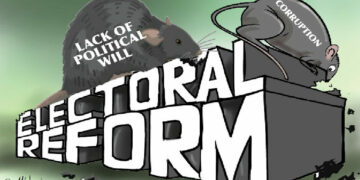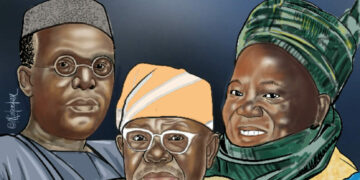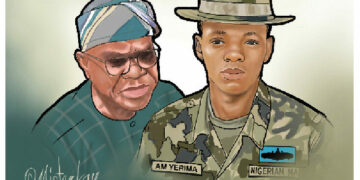Finally, I am writing because of two character traits – not entirely wholesome but they have their uses: stubbornness and doubt.
I have written about Nigeria since 2008 and increasingly, I am unsure of what else to say about the opportunities for and challenges to making Nigeria a more just and productive society. Each election cycle magnifies my desire to detach. Elections are the once in 4 years opportunity to reset, get our bearings, course correct; we allow ourselves to dream and believe, but elections and election results are becoming meaningless. Regardless of who comes into power, the ethics and culture of politics and governance rarely improves. After the 2023 elections, I shelved writing for Business Day and put away the camera for Political News In 5. I needed a break.
Why am I here again, once a week on the back page of LEADERSHIP?
I admit to still processing this decision but it could do with a combination factors and events.
First, was a working trip to Abuja and Lagos in July as an ideas hunter. Part of my responsibility as a member of Open Society Foundations’ Ideas Workshop is to support critical thinking and heterodox ideas expressed through culture and art. In other words, the intersection of social imaginary with the reassessment of first principles and debates related to how society functions and evolves. Who is producing new knowledge related to democracy, climate and identity politics? In what spaces do people who do not usually talk to each other, convene to discuss the possibilities of recasting global and continental orders and reimagining a post neoliberal world? What topics dominate the conversations of young people, artists, academics, thinkers? Depending on who you speak with, it is Africanfuturism, identity politics and intergenerational divides.
The most pro establishment meeting, with University of Lagos academics and their first female Vice Chancellor, Prof. Ogunsola, was radical. Research data about intra-west Africa migration should shatter the narrative of Africans flooding Europe and IADS studying Ifa for insights into current challenges will be a wonderful contribution to global knowledge. A late-night visit to JK Randle Centre for Yoruba Culture and History with Seun Oduwole, the architect for the project, still fills me with awe. The Centre’s location, opposite the National Museum built by the British in 1959, adds poignancy about government’s nonappreciation for the power of art and history. Maybe they know.
I could have spent an entire day at Onikan House, built in 1939 and attentively restored by Loving Lagos. It is a monument to a question: where can my children experience the history of Lagos? Sadly, for every historical site preserved, there are hundreds thoughtlessly destroyed, like the 300-year-old Bajulaiye Palace and the iconic gates of Tafawa Balewa Square.
My visit left me with questions
Why didn’t I learn of JK Randle in social studies or history? Where is the FCT’s national museum, a needed space for history, culture, art and imagination? How many preservation societies are there? Who else is curating walks through ancient parts of our towns? Anyone working on a documentary on Mamman Shata?
The Art Tech District fills gaps in Abuja’s history and culture space with the digital museum – no doubt, provoking debate and reflection like its profile of Abacha did for me. The books that people read are windows, and discussing Nigeria with founders of Spine and Label and Roving Heights was educative.
Nigerians are doing incredible things, thinking profoundly about a better society and putting their ideas out in the world through poetry, exhibitions, books, documentaries, films, architecture and fashion. Adire as code; who knew. I want to learn as I write about them.
The second factor weighing on my decision to write is the polycrisis – a popular newish word for an age-old global situation: multiple problems that intersect and compound each other. Once, the challenges were slavery, war and modernity, today, one could use those same three words but The Anthropocene, inequality and disinformation will do. Each generation thinks the era it lives in is definitive; we will always live in interesting times, perpetually cursed.
The free market economic principles that are the foundation for neoliberalism, now blamed for some of the strongest convulsions wracking the world, were deliberately formulated and promoted in 1947 by the Mont Pelerin Society led by Friedrich Hayek. That same intentionality is required today to reimagine and formulate alternative economic principles for the future.
We need various collectives of diverse people and experiences to fashion the new
Democratic regression is linked to neoliberal capitalism which is in turn connected to critiques of individualism, consumerism and global warming. Food shortage, supply chain disruptions and the weaponization of human identity markers all linked globally. How are Nigerians, Africans engaging on these issues and with whom? We look to England when we could work with Brazilians; maybe answers lie with unlikely interlocutors and partnerships. I want to explore as I write.
Finally, I am writing because of two character traits – not entirely wholesome but they have their uses: stubbornness and doubt.
It is difficult to capitulate and cede the space to those who have a different ideology about how Nigeria should be governed and what our society can be. While it is a stretch to pretend that those who compromise law and order and personalize governance are driven by ideology – as long as those people remain the majority within our political and governance systems, then pointing out the harm they do to the collective will remain necessary, if unrewarded, work. A chance hour with Wole Soyinka, discussing tolerance and community in the context of Bala and Isese, energized me. At 89 he is still engaged in the struggle for a better society. Writing will be my contribution to holding the line against the danger of any single story.
Over time, life and knowledge have fundamentally changed my understanding about certain things, and now, I leave room for doubt. Maybe my articles will foster an ecosystem of critique and dissent and like Fanon, we will become people who question what we think we know and believe and what those with power tell us.
Over time, life and knowledge have fundamentally changed my understanding about certain things, and now, I leave room for doubt. Maybe my articles will foster an ecosystem of critique and dissent and like Fanon, we will become people who question what we think we know and believe and what those with power tell us.





